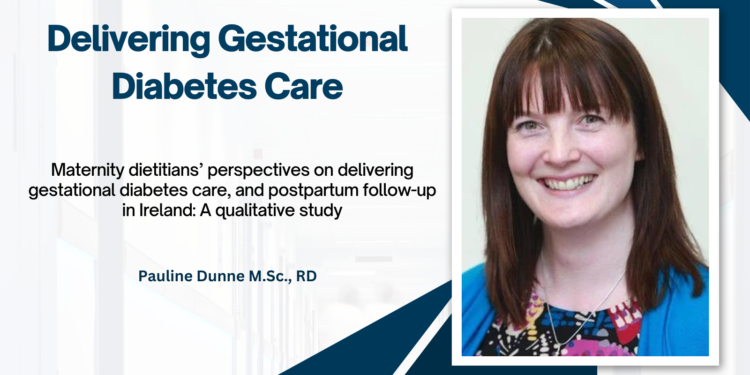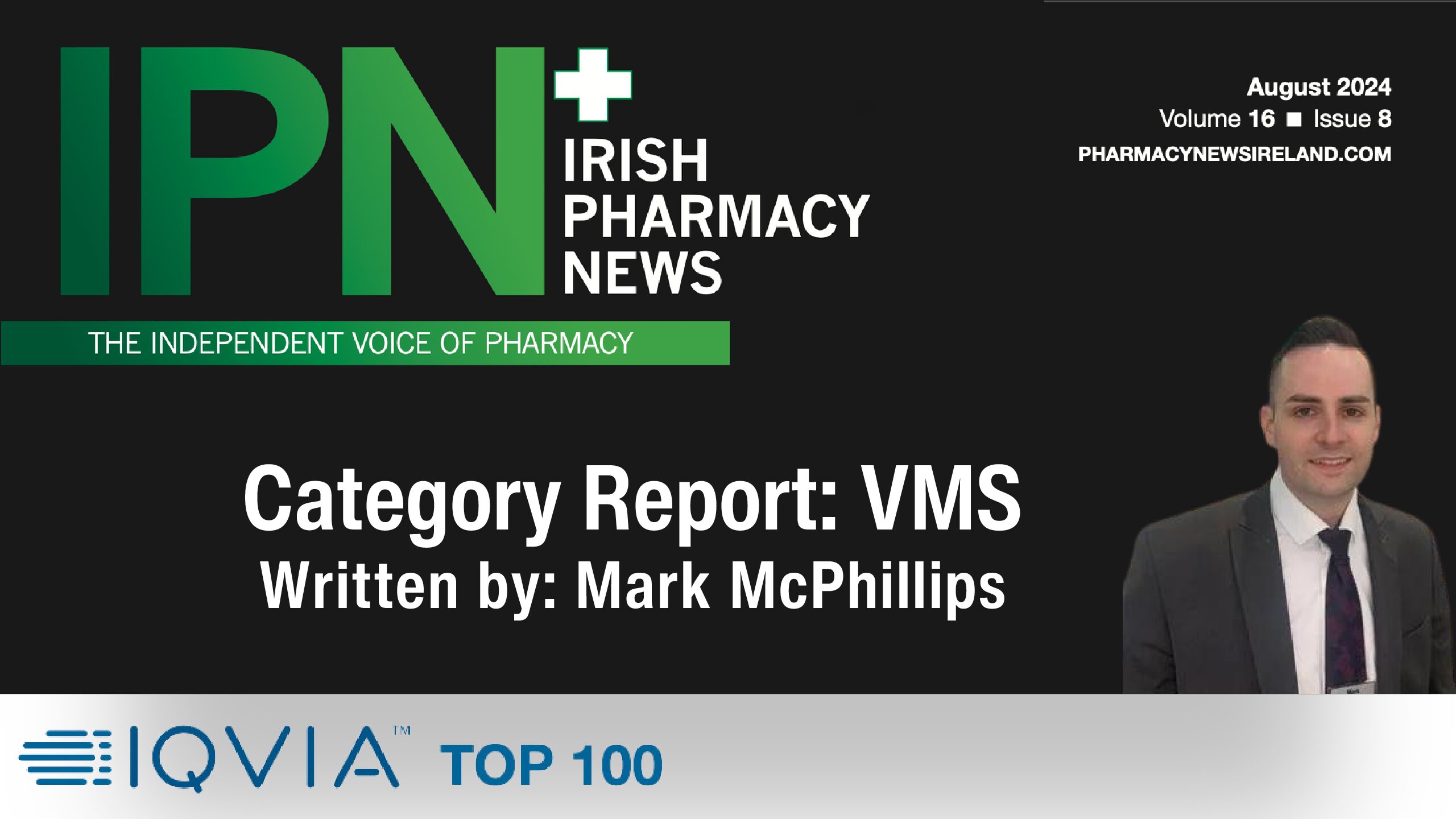Maternity dietitians’ perspectives on delivering gestational diabetes care, and postpartum follow-up in Ireland: A qualitative study
Written by: Pauline Dunne (Ph.D. candidate UCD), Márcia Carvalho (Ph.D. candidate University of Galway), Prof. Molly Byrne (Professor of Health Psychology, University of Galway), Prof. Andrew W. Murphy (Foundation Professor of General Practice, University of Galway), Prof. Sharleen O’Reilly (Associate Professor in Human Nutrition UCD).
Background – The prevalence of gestational diabetes mellitus (GDM) in Europe is approximately 5.4%,1 with varying rates influenced by population characteristics, diagnostic criteria, and screening strategies. In the Republic of Ireland, GDM prevalence is reported at 12.4%,2 posing health risks for both mother and child, leading to increased healthcare costs. Women with GDM face upwards of seven-fold risk of developing type 2 diabetes (T2D), with potential implications for health services.3–6
Pauline Dunne M.Sc., RD
This research is funded under a Health Research Board Collaborative Doctoral Award, 2019 (CDA-2019-001).
GDM management involves blood glucose monitoring, medical nutrition therapy (MNT), physical activity, and weight management.7,8 While most women manage GDM with these strategies, 15-30% may require metformin or insulin.9 Despite the central role of MNT,10 there are no universally adopted nutrition guidelines for GDM management, leading to inconsistencies in dietary recommendations. Internationally, dietitians have high levels of training and consistency in GDM management, yet challenges in knowledge translation and resource disparities persist.11–13 In Ireland, limited research exists on dietitian involvement in GDM management,14,15 with no national prevention programme or guideline. This study sought to explore the perspectives of dietitians working in Ireland on GDM management, addressing gaps in understanding and providing insights for potential improvements in care and guidelines.
Methods
The study employed a qualitative approach, using focus group discussions and individual semi-structured interviews that were conducted from February to March 2021. Participants were required to: (i) be a registered dietitian in the Republic of Ireland, (ii) have a caseload which included women with GDM during pregnancy and/or postpartum, and (iii) be willing to discuss their knowledge, experiences, and perspectives on GDM. A purposive sampling approach aided recruitment,16 with a call out through the Irish Nutrition & Dietetic Institute, Maternity Dietitians of Ireland specialist interest group, and direct call and/ or email to nutrition & dietetic departments at maternity hospitals in Ireland. The study did not predetermine sample size but considered information power and data richness to determine adequacy of sampling.17
The interviews and focus groups were conducted online due to COVID-19 restrictions, and the topic guide focused on GDM diagnosis, treatment, and postpartum care including T2D prevention. Each session was transcribed using Otter.ai, and NVivo v.12 software facilitated coding and analysis. The research team, comprising experienced dietitians and a health psychologist, performed reflexive thematic analysis with an inductive orientation to the data.18-20 The study aimed to identify experiential insights, employing a realist theoretical framework.
Data analysis involved six phases, including familiarization, initial code generation, theme development, theme review, definition and naming, and report production.18,21 Theme conceptualisation, identification of boundaries, and coherence were addressed in developing the themes. Regular discussions took place to hone and confirm themes as true reflections of participant contributions. Once themes were developed, they were named, defined, and described with relevant excerpts from the transcripts and refined through regular discussions until the final versions were agreed on.
Results
Sixteen dietitians from 13 of 19 Irish maternity settings participated. The participants were all female and worked with individuals with GDM with varying levels of frequency. There was significant regional disparity and variation reported in the allocation of dietetic services for GDM.
The three themes generated were:
A Complex Layered Role: Dietitians saw their primary role as providing nutritional guidance in a multidisciplinary context. All participants reported varied caseloads. Dietitians reported using a standardised resource, “The National Diet Sheet”, ensuring consistency in information delivery. There was a need for empathy in addressing complex needs of patients, particularly when supporting those newly diagnosed with GDM, and challenges in addressing sensitive topics such as gestational weight gain.
Challenges to Providing
Optimum Care: For many nutrition & dietetic services, the COVID-19 pandemic necessitated a shift to online delivery, impacting group dynamics and peer support. Participants reported improved attendance rates with online education sessions but acknowledged disadvantages such as the lack of peer support. Issues of unequal care distribution, and limited time for health promotion, T2D prevention, and breastfeeding advice were highlighted. Inconsistencies in postpartum care and a lack of defined GDM care pathways were also reported, leading to frustration among participants.
Framing Future Health Needs: Participants perceived the sixweek postpartum check (routinely offered to new mothers) as a missed opportunity for T2D prevention. Participating dietitians felt low T2D risk awareness among women (with GDM) and healthcare professionals, as a contributing factor to gaps in follow-up care. The need for a readily accessible T2D prevention programme, improved communication between hospital and community-based services, and a standardised national approach for follow-up (after GDM) were emphasised.
Discussion
The study reveals that dietitians consider themselves central to delivering MNT in GDM care. Despite a perceived national disparity in dietetic resource allocation, participants’ experiences and views were generally consistent. The dietitian’s role extends beyond traditional nutrition advice, involving nuanced, empathetic management within limited resources. Study findings broadly align with studies from other healthcare settings,11,12,22 however are unique in emphasising the complexity of the dietitian role in GDM management and potential role of the dietitian in postpartum T2D prevention.
Participants acknowledged the stigma associated with GDM and recognised the need to sensitively support patients’ emotional needs. Notably, there is no minimum standard for dietetic resource allocation in GDM management in Ireland. Many dietitians reported a single contact with an individual during their GDM pregnancy, similar to other studies,12,23 leading to reported disparities in care and insufficient resources to meet growing service demand.
The COVID-19 pandemic prompted a shift to online MNT delivery, providing efficiency but raising concerns about reduced patient-centeredness due to diminished peer support. System-level barriers were identified for postpartum dietetic follow-up, with primary care deemed optimal for follow-up services and T2D prevention. Inconsistencies and lack of clarity in postpartum care processes were noted, emphasising the need for a defined follow-up approach.
While T2D prevention programmes were deemed crucial, they are lacking in Ireland. Research demonstrates dietitians as suitable leads for diabetes prevention programmes,24,25 and emphasises the need for tailored programmes for women with GDM.26 Breastfeeding has a key part to play in T2D prevention as it is associated with reduced fasting glucose levels postpartum and lower future T2D risk.27–29 Limited resources impacted dietetic promotion of breastfeeding, although with proper training, dietitians could effectively contribute to breastfeeding support.30,31
Conclusion
The development of a robust national MNT framework for GDM management, which defines roles and responsibilities would offer an evidence-based approach to both service development and clinical decision making. Additionally, provision of training and resources would support dietitians to effectively offer chronic disease prevention programmes, providing health promotion counselling to postpartum women with prior GDM, and addressing long term health risks such as future T2D and cardiovascular disease. Ensuring consistency in MNT delivery through the adoption of evidencebased standards of care is vital to optimise outcomes of MNT for women with GDM.
Dunne P, Carvalho M, Byrne M, Murphy AW, O’Reilly S. Maternity dietitians’ perspectives on delivering gestational diabetes care, and postpartum follow-up in Ireland: A qualitative study. J Acad Nutr Diet. 2023 Dec 27:S22122672(23)01766-5. doi:10.1016/j. jand.2023.12.012. Epub ahead of print. PMID: 38158178.
Full text of the publication can be accessed here https://authors.elsevier.com/ a/1iX5L7t0kP%7EUZ1. Access is free of charge until March 22nd, 2024.

References available on request
Retina International World Congress Dublin
The countdown is on for what will be one of the biggest global gatherings of eye experts taking place in 2024. The Retina International World Congress, which sees Dublin take up the mantle from Reykjavík, which hosted the event in 2022, will take place at the Dublin Royal Convention Centre, Radisson Blu Royal Hotel from June 5-8.
The congress features world-class speakers at the vanguard of eye research, treatment and care across a number of events taking place over four days.
The highlight for the scientific and medical communities promises to be the scientific conference, Targeting the Cure, the Future of Vision Research, being held on Friday June 7.
The congress brings together scientists, clinicians, patient advocates and people with a vision impairment from around the world in a shared effort to combine their know-how and expertise to zone in on cures. Registration is now open for those wishing to attend at www.fightingblindness.ie
For Dr Ellen Moran, Scientific Programme Manager at Fighting Blindness, the identification of genes implicated in vision loss, and a genetic diagnosis of patients, are key to ensuring no delay in accessing new therapies that may save and restore their sight, “It is rare to have such a gathering of international eye experts committed to treatment and cures on our own doorstep. This congress offers a valuable opportunity to profile the cutting-edge research and advances taking place, to pool ideas and share insights, and to forge new relationships and research endeavours. I would strongly urge those who want to continue to be abreast of the latest research developments taking place, and that our patients don’t lose out in accessing new therapies, to make a date with the Retina International World Congress this June.”












